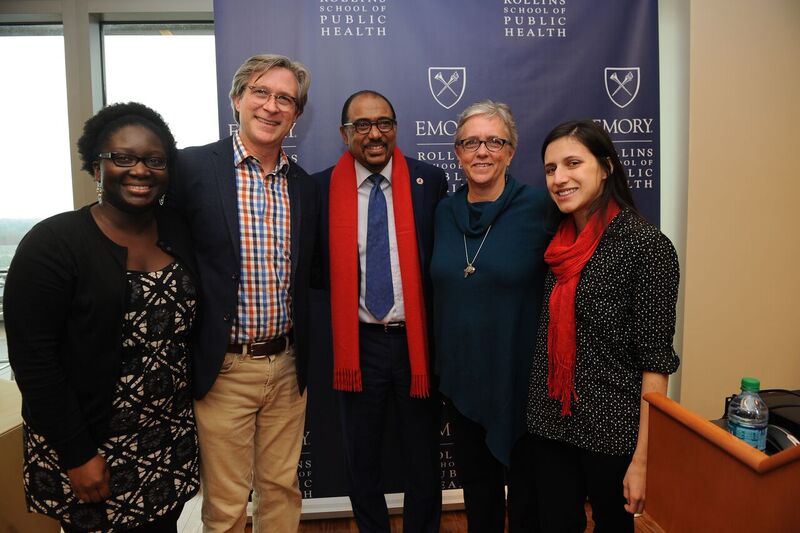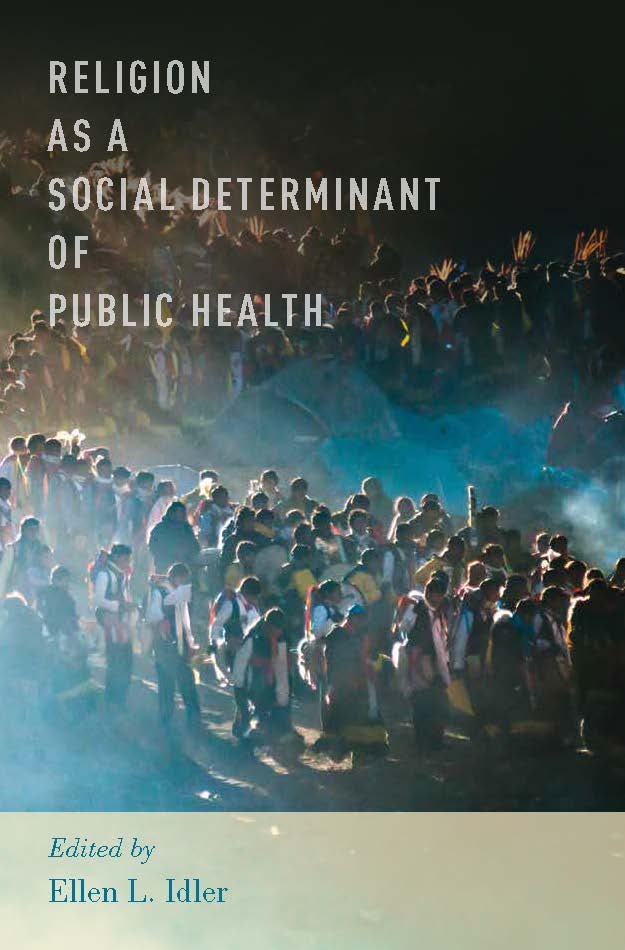Emory University
RELIGION AND PUBLIC HEALTH COLLABORATIVE
NEW WEBSITE COMING SOON!
Day(s)
:
Hour(s)
:
Minute(s)
:
Second(s)
RELIGION AND PUBLIC HEALTH AT EMORY
The inquiry into the ways in which religion and public health intersect has a vibrant presence at Emory University.
OUR BOOK
“Religion as a Social Determinant of Public Health”, edited by Ellen Idler, Director of the Religion and Public Health Collaborative and Professor of Sociology Oxford University Press, 2014.
DUAL DEGREE PROGRAM
Students can earn a joint MDiv/MPH or a joint MTS/MPH through the RPHC’s dual-degree programs with the Candler School of Theology and the Rollins School of Public Health.
RELIGION AND PUBLIC HEALTH AT EMORY

Members of the RPHC and IHP pose with Michel Sidibe, Executive Director of UNAIDS, at the Rollins School of Public Health, February 2017.
The inquiry into the ways in which religion and public health intersect has a vibrant presence at Emory University. Emory’s distinctive Department of Sociology and the Rollins School of Public Health provide the undergirding for the work of two Emory entities, the Religion and Public Health Collaborative and the Interfaith Health Program. These two programs study the relationship of religion and public health and its effects, both positive and negative, on the communities around the world, and they actively partner with one another through teaching, research, and service.
The Religion and Public Health Collaborative (RPHC) has its roots at Emory as part of Emory’s strategic plan, “Where Courageous Inquiry Leads.” Its primary focus is to encourage a multi-school, interdisciplinary conversation on religion as a social determinant of public health within Emory, the wider Atlanta community, and with national and international public health practitioners and research scholars.
The Interfaith Health Program (IHP) at the Rollins School of Public Heath began at the Carter Center in 1992, with the aim of advancing the health of individuals and communities, particularly through prevention and health promotion. Its national and global reach connects government leaders, religious organizations, academic institutions, and a wide variety of community partners to address the challenges and opportunities of this field of inquiry. The most current research of IHP focuses on the role of faith-based health providers delivering HIV services, treatment, and care to key populations in Kenya.
Courses in religion and public health have been offered regularly since 2003. These courses are cross-listed with the Rollins School of Public Health and the Candler School of Theology, enrolling students from both professional schools. Emory offers a dual degree program (MDiv/MPH and MTS/MPH) for students planning to work at the intersection of these fields, a religion and health certificate for both public health and theology students, local and global experiential learning opportunities, and frequent events and co-curricular activities for students in both schools. These programs are coordinated by the Religion and Public Health Collaborative, but regularly intersect with other Emory professional schools and centers, such as Candler, Emory College, Center for Ethics, School of Medicine, Graduate Division of Religion, School of Nursing, and Spiritual Health at Emory Healthcare.
Religion as a social determinant of public health remains the “hidden” social determinant, and both the Religion and Public Health Collaborative and the Interfaith Health Program are working tirelessly to raise awareness of the crucial relationship between religion/religious communities and the communities that surround them. As James Curran, MD, Dean of the Rollins School of Public Health, explains in his preface to our edited volume Religion as a Social Determinant of Public Health, “Improvement in the health of populations depends upon a strong assessment of all factors affecting health, including the knowledge and beliefs of constituents. In fulfillment of their social mission, religious communities can provide substantial and sustained resources to address health inequities to improve the public health.”
“RELIGION AS A SOCIAL DETERMINANT OF PUBLIC HEALTH”
Oxford University Press, 2014
In the fall of 2010, Ellen Idler, Director of the Religion and Public Health Collaborative and Professor of Sociology, convened an interdisciplinary faculty seminar at Emory that explored both the positive and negative intersections of religion and public health. Faculty from the schools of public health, theology, medicine, nursing, and the graduate school met monthly, discussing the complex relationship of religion and public health, two institutions that often share common interests but sometimes find themselves in opposition. What was clear at the outset was this: religion was an invisible and unacknowledged but utterly crucial social determinant of public health. Over the next 3 years, this book was written by this amazing group of scholars; in these pages, there are 35 voices that speak to practice, history, the lifecourse, global health, epidemics, and the future. Published on September 1, 2014 by Oxford University Press, the edited volume entitled Religion as a Social Determinant of Public Health is the definitive book for this field of inquiry.
More details about the book can be found at the Oxford University Press website.
MDiv/MPH and MTS/MPH DUAL DEGREE PROGRAM
Students can earn either a joint MDiv/MPH or a joint MTS/MPH through the RPHC’s dual-degree programs with the Candler School of Theology and the Rollins School of Public Health. These programs are unique in that they bring together the health sciences, the social sciences, and religion to teach students about the personal, communal, institutional, and social dimensions of health.
Students in these programs will learn to:
- Analyze the way faith contributes to the promotion or inhibition of health of persons and communities from various religious and spiritual traditions
- Analyze the way religion, health, and their structures impact persons, communities, and larger systems and how they influence public policy and institutional practices
Students are encouraged to use the broad resources of the university throughout their studies. This program is inclusive and respective of the religious and faith traditions of all students and the cultural contexts of their professional practices.
MDiv/MPH
The joint Master of Divinity and Master of Public Health (MDiv/MPH) degree program is offered in cooperation between the Candler School of Theology and the Rollins School of Public Health.
This program allows the MDiv and MPH degrees to be earned in four years instead of the usual five to earn the degrees separately. Candidates for the joint-degree program must apply to and be accepted by both Candler and Rollins. The schools have independent application procedures.
Students spend their first year at Candler, their second year at Rollins, and their third and fourth years at Candler. Students must be registered and pay tuition for six semesters at Candler and two semesters at Rollins, but during this time students may take courses in either school. Candler scholarships and grants are applicable only to the semesters students are in residency at Candler.
To meet degree requirements for the MDiv, the student must complete a minimum of 86 hours at Candler. All requirements are the same as a traditional MDiv student.
To meet degree requirements for the MPH, the student must complete a minimum of 32 to 35 hours at Rollins, including the practicum and special studies project or thesis. Specific MPH degree requirements depend on the department.
Rollins offers the dual-degree program in seven departments: Behavioral Sciences and Health Education, Environmental and Occupational Health, Epidemiology, Global Environmental Health, Global Epidemiology, Global Health, and Health Policy and Management.
MDiv/MPH dual-degree students may complete the MPH practicum requirement through completion of a clinical Contextual Education placement.
For information about the MDiv, contact the Candler registrar’s office at candlerregistrar@emory.edu.
For information about the MPH, contact Kathy Wollenzien at kwollen@sph.emory.edu.
MTS/MPH
The joint Master of Theological Studies and Master of Public Health (MTS/MPH) is offered in cooperation between the Candler School of Theology and the Rollins School of Public Health. This program allows the MTS and MPH degrees to be earned in three years instead of the usual four to attain the degrees separately.
Candidates for the joint-degree program must apply to and be accepted by both Candler and Rollins. The schools have independent application procedures.
Students spend their first year at Candler, their second year at Rollins, and their third year at Candler. Students must be registered and pay tuition for four semesters at Candler and two semesters at Rollins, but during this time students may take courses in either school. Candler scholarships and grants are applicable only to the semesters students are in residency at Candler.
To meet degree requirements for the MPH, the student must complete a minimum of 32 to 35 hours at Rollins, including the practicum and special studies project or thesis. Specific MPH degree requirements depend on the department.
Rollins offers the dual-degree program in seven departments: Behavioral Sciences and Health Education, Environmental and Occupational Health, Epidemiology, Global Environmental Health, Global Epidemiology, Global Health, and Health Policy and Management.
MTS/MPH dual-degree students may complete the MPH special studies project or thesis in conjunction with the MTS integrative paper or thesis.
For information about the MTS, contact the Candler registrar office at candlerregistrar@emory.edu.
For information about the MPH, contact Kathy Wollenzien at kwollen@sph.emory.edu.
